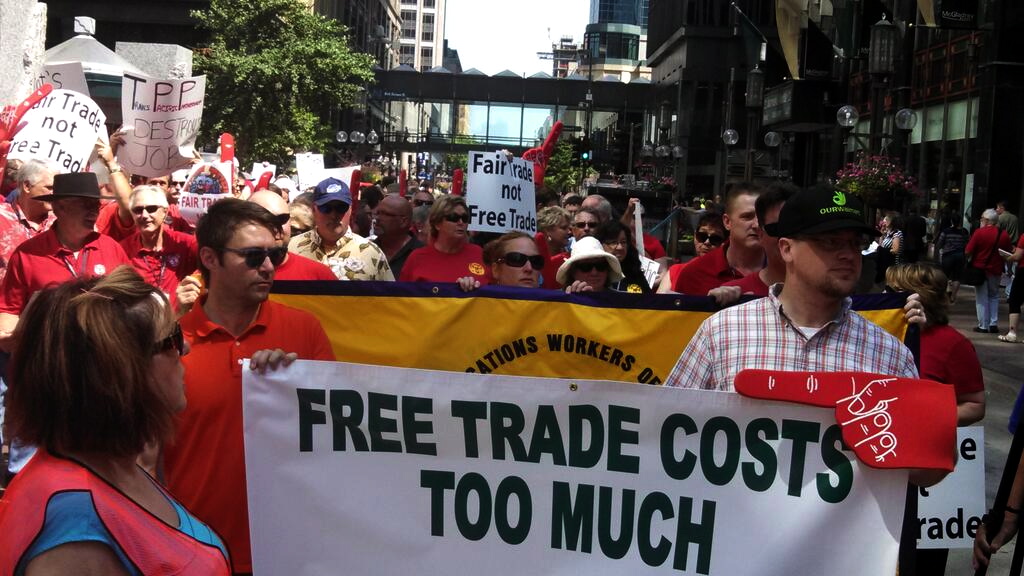
Donald Trump has vowed to renegotiate NAFTA and other international free trade deals if elected president, saying they are costing U.S. jobs and killing the economy. Supporters say the trade deals lower prices for American consumers. Voters are not big fans of free trade deals like NAFTA but also strongly believe that the politicians negotiating those deals don’t care what they think anyway.
A new Rasmussen Reports national telephone survey finds that 50% of Likely U.S. Voters think the North American Free Trade Agreement (NAFTA) with Canada and Mexico needs to be renegotiated. Just 27% disagree, but nearly as many (23%) are not sure. (To see survey question wording, click here.)
Interestingly, support for renegotiation was slightly higher at 56% in June 2008 when Republican presidential candidate John McCain was defending NAFTA, while his Democratic opponent Barack Obama was calling for changes in it. Now, however, Obama and presumptive Democratic nominee Hillary Clinton are defending the 1994 pact which lowers nearly all trade barriers between the three countries from attacks by the likely 2016 GOP nominee.
Only 29% of voters now believe most U.S. free trade agreements with other countries have been good for America. Forty-nine percent (49%) say they have been bad for the country instead. Just six percent (6%) say these agreements have had no impact. Sixteen percent (16%) are undecided. This is a more critical assessment of the deals than voters had eight years ago.
Republicans and voters not affiliated with either major party are more critical of NAFTA and free trade deals in general than Democrats are.
But only seven percent (7%) of all voters think politicians listen most to voters when it comes to trade issues. Forty-nine percent (49%) say politicians listen most to whoever makes the biggest contribution to them, while 28% say business leaders come first. Eight percent (8%) believe politicians listen most to other world leaders on trade issues. These findings are little changed from the 2008 presidential campaign season.
The survey of 1,000 Likely Voters was conducted on June 30 and July 3, 2016 by Rasmussen Reports. The margin of sampling error is +/- 3 percentage points with a 95% level of confidence. Field work for all Rasmussen Reports surveys is conducted by Pulse Opinion Research, LLC. See methodology.
A little over a year ago, just 43% of Americans felt free trade was good for the country. Forty percent (40%) said it takes away American jobs, but 50% felt it was good for consumers.
Sixty-two percent (62%) of Republicans and unaffiliated voters by a 52% to 24% margin think NAFTA needs to be renegotiated. Only 38% of Democrats agree.
The findings are nearly identical when it comes to free trade agreements in general. Most GOP and unaffiliated voters think they are bad for America. Democrats are far less likely to agree and, in fact, are a bit more likely to believe that they are good for the country.
But voters in all three parties are in general agreement that politicians listen more to big contributors and business leaders than to voters when it comes to trade issues.
Men and those 40 and over are more critical of NAFTA and free trade agreements in general than women and younger voters are.
But voters under 40 were Bernie Sanders’ most enthusiastic supporters, and in his unsuccessful bid against Clinton for the Democratic nomination, Sanders also was critical of America’s free trade deals. Perhaps this helps explain why this age group is the most likely to be undecided on these questions.
Among voters who think NAFTA needs to be renegotiated, 76% believe most U.S. free trade agreements with other countries have been bad for America. Sixty-two percent (62%) of those who think NAFTA is fine as is feel that most free trade deals have been good for this country.
The U.S. economy historically has had an average annual growth rate of 3.3% but has fallen short of that number in every year of Obama’s presidency. Still, his fellow Democrats give the president positive marks for his economic performance and think Clinton would do more of the same. Trump, on the other hand, is expected to make the economy better by all voters – except Democrats.
Most voters still believe the U.S. economy is unfair to the middle class. But voters say that economic growth is more important than economic fairness, and they give a thumbs up to policies that expand the economy over policies that promote fairness.
Trump has edged ahead of Clinton in our latest weekly White House Watch survey.
Additional information from this survey and a full demographic breakdown are available to Platinum Members only.



Expositores: Oscar Vidarte (PUCP) Fernando González Vigil (Universidad del Pacífico) Inscripciones aquí. Leer más
Una retrospectiva para entender los próximos cuatro años. Leer más
En la conferencia se hará una presentación de los temas más relevantes del proceso de negociación se llevó a cabo desde el 2012, así como del acuerdo de paz firmado entre el Gobierno colombiano y la guerrilla de las FARC a finales del 2016. Se analizarán los desafíos y las... Leer más
El Observatorio de las Relaciones Peruano-Norteamericanas (ORPN) de la Universidad del Pacífico es un programa encargado de analizar y difundir información relevante sobre la situación política, económica y social de Estados Unidos y analizar, desde una perspectiva multidisciplinaria, su efecto en las relaciones bilaterales con el Perú.
© 2026 Universidad del Pacífico - Departamento Académico de Humanidades. Todos los derechos reservados.

